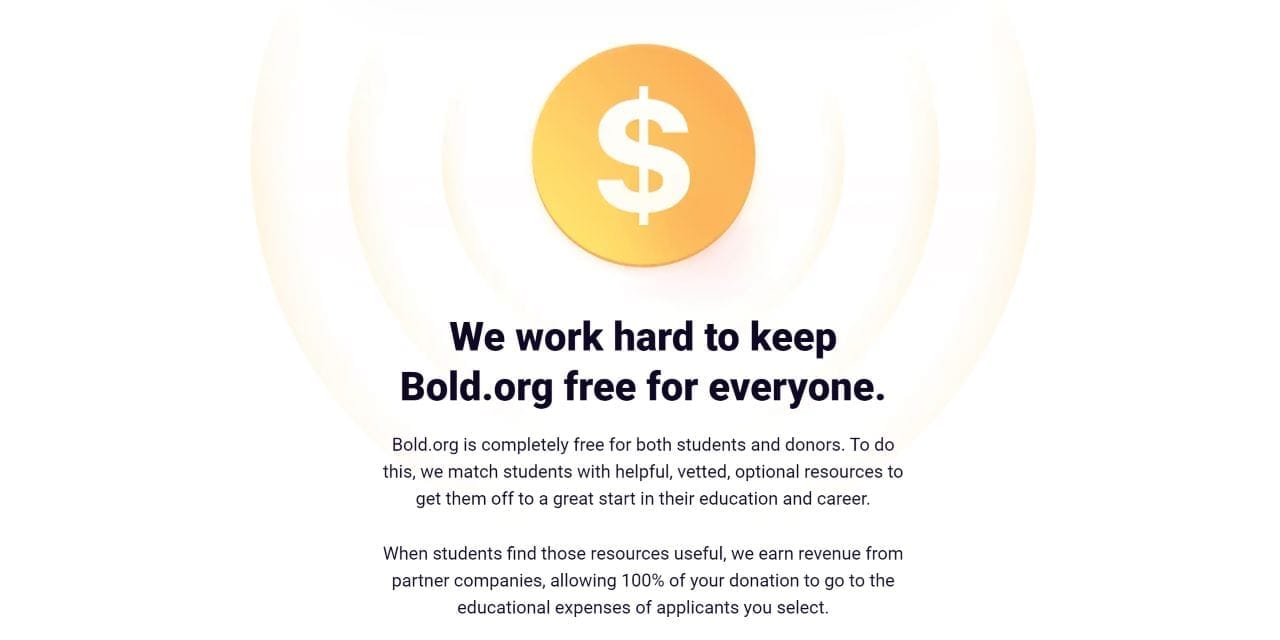How to Start a Fundraiser: A Step-by-Step Guide
Whether you're passionate about a cause close to your heart or looking to raise funds for a special project, starting a fundraiser is a rewarding experience. While raising money, you can rally support from your community and make a positive impact on the world. However, embarking on this journey can be daunting if you don't know where to begin. In this step-by-step guide, we'll walk you through the key stages of starting a successful fundraiser, as well as answers to some frequently asked questions about how to start a fundraiser.
Here at Bold.org, we are committed to helping students eliminate student debt. Check out our Scholarship Blog for more information and learn how to apply for scholarships today!

Understanding Fundraising Basics
Before you dive into planning and executing your fundraiser or fundraising event, it's important to have a solid understanding of the basics of fundraising. Let's take a closer look at some of the important steps you need to take in order to ensure the success of your fundraising campaign.
Defining Your Cause
The first step in starting a fundraiser is defining your cause. What issue or project are you passionate about? Is it a local community initiative, a global humanitarian cause, or a personal project? Take the time to clearly define the cause you want to support. This clarity will help you craft a compelling message and attract like-minded individuals to your fundraising goal.
When defining your cause, it's important to consider its relevance and impact. Is it something that resonates with a large number of people? Does it address a pressing issue in society? By choosing a cause that is meaningful and significant, you increase your chances of garnering support and raising funds.
Setting Fundraising Goals
Once you've defined your cause, it's crucial to set specific fundraising goals. Determine how much money you want to raise and by when. Setting achievable goals will help you stay focused and motivated throughout the duration of your fundraiser. Your goals should be realistic yet ambitious.
Sharing your progress towards these goals can also attract new donors while amplifying your organization's mission. New donors are more likely to contribute to a cause that is visibly successful and already close to its fundraising goal. Sharing progress towards your goal through a campaign page enables you to accept online donations while assuring recurring donors of the success of the fundraising process.
When setting your fundraising goals, consider the scope of your fundraising project and the resources available to you. Are you aiming to raise a small amount for a local project, or do you have grand aspirations for a global campaign? Understanding the scale of your goals will help you develop an effective fundraising strategy and allocate resources accordingly.

Identifying Your Target Audience
It is essential to identify your target audience when raising money. Consider who would be most interested in supporting your cause. Is it individuals in your local community, a specific demographic, or a niche market? Understanding your target audience will guide your promotional efforts and help you tailor your message accordingly.
When identifying your target audience, it's important to consider their interests, values, and motivations. What would inspire them to donate to your cause? By understanding the needs and preferences of your target audience, you can create compelling marketing materials and engage them in a meaningful way.
You can also create personalized promotional materials and even a social media campaign specifically for your audience. By tailoring your marketing channels and social media channels to your target supporters, you can further engage donors and raise awareness. You could partner with corporate sponsors to reach a specific niche audience. Other strategies include direct mail and social media ads aimed at your target demographics that link back to an online donation page or your own website.
Remember, fundraising is not just about asking for donations. It's about building relationships and connecting with people who share your passion for the cause. By understanding the foundation of effective fundraising, you can raise money, mobilize existing donors, and bring about positive change.
Planning Your Fundraising Strategy
Now that you have a clear vision of your goals and audience, it's time to plan your fundraising strategy. This planning involves making important decisions regarding the platform you'll use, creating a timeline, and building a team to support your efforts. A successful fundraising campaign requires careful planning and execution. Let's dive deeper into the key components of planning your fundraising strategy.
Choosing the Right Fundraising Platform
One of the first decisions you'll need to make is choosing the right fundraising platform. There are numerous platforms available for launching online fundraising campaigns, each with its own features and fees. Research the options, compare their features, and select an online donation form that aligns with your goals and budget.
Consider factors such as ease of use, payment processing options, and social sharing capabilities. Some platforms offer built-in marketing tools and analytics, while others focus on providing a user-friendly interface. Other platforms facilitate future fundraising campaigns by rewarding recurring engagement. Take the time to explore different platforms and read reviews from other fundraisers to make an informed decision.
Using Bold.org, you can create a customized scholarship, fellowship, or grant in minutes. Setting up a scholarship is straightforward and simple through Bold.
If you are interested in becoming a donor, please visit Bold.org for more information and create your profile today!
Creating a Fundraising Timeline
Creating a fundraising timeline is essential to stay organized and achieving your goals. Break down your fundraising campaign into milestones and assign specific tasks to each phase. This strategy will help you stay on track, avoid last-minute stress, and delegate tasks.
Start by setting a launch date for your campaign and work backward to determine when each milestone should be completed. Allow ample time for planning, designing social media posts, marketing and promotion, and donor engagement. Consider incorporating different fundraising events throughout the timeline to keep the momentum going and maintain donor interest.

Building Your Fundraising Team
While it's possible to manage a fundraiser on your own, building a team can significantly enhance your fundraising campaign. Recruit enthusiastic individuals to your nonprofit organization who share your passion for the cause. Assign roles and responsibilities based on their strengths and interests.
A dedicated team can provide valuable support in areas such as marketing, event planning, and donor relations. They can help spread awareness of your campaign, reach out to potential donors, and assist with organizing fundraising events. Collaborating with a team not only lightens the workload but also brings fresh perspectives and ideas to the table.
When building your team, consider reaching out to event space managers, nonprofit organization volunteers, event team members, local businesses or restaurants, or even partnering with other nonprofit organizations that have a similar mission. Together, you can leverage each other's networks and resources to maximize the impact of your fundraising efforts. You can also connect with younger donors or recurring donors in order to recruit more people to your cause.
Once you have a solid plan in place, it's time to execute it with dedication and enthusiasm. Stay adaptable and be prepared to make adjustments along the way. With a well-thought-out strategy and a motivated team, you're on your way to raising funds and achieving fundraising success!

Crafting Your Fundraising Message
Now that you have a solid foundation for your fundraiser, it's time to craft a compelling and persuasive message. Consider the power of storytelling to share your personal connection to the cause. By sharing your own experiences and emotions, you can connect with your audience on a deeper level.
People are more likely to donate when they feel personally connected to the cause, so be sure to convey the tangible impact of their contributions. Your message should resonate with your audience while clearly communicating the difference their support will make.
Consider incorporating real-life stories, testimonials, or statistics that highlight the need for support. These help your audience understand the urgency and importance of their contribution. By providing concrete examples of how their support can make a difference, you can inspire them to take action and raise money.
Telling Your Story Effectively
Sharing your story effectively involves not only conveying your personal connection to the cause but also engaging your audience through compelling storytelling techniques. Consider using vivid imagery, descriptive language, and relatable anecdotes to captivate your audience's attention. Paint a picture with your words, allowing them to visualize the impact their support can have.
Storytelling is not just about sharing facts and figures; it's about creating an emotional connection that resonates with your audience. By appealing to their emotions, you can motivate them to become active participants in your cause.
Communicating Your Fundraising Goals
While telling your story is important, it is equally crucial to clearly communicate your fundraising goals and how the funds raised will be used. Transparency is key in building trust with your donors.
Break down the impact of different donation amounts or provide examples of how the funds will directly benefit your cause. By illustrating the tangible outcomes that their contributions can achieve, you can inspire potential donors to support your cause. Whether it's funding a specific project, providing resources to those in need, or supporting ongoing research, be specific and honest about where the funds will go.
Consider sharing success stories or testimonials from past fundraising efforts. This information can demonstrate your organization's track record of making a difference and reassure new donors that their contributions will be put to good use, especially when donating online.
Making Your Call to Action Clear
A clear and compelling call to action is crucial in motivating your audience to take the next step. After capturing their attention and engaging them with your story, clearly state what action you want your audience to take.
Whether it's making a donation, attending an event, or sharing your fundraiser with their network, make it easy for them to take action. Provide clear instructions and user-friendly online donation options. Consider utilizing online platforms or mobile apps that simplify the donation process, making it convenient for your audience to contribute.
Additionally, emphasize the urgency of their support. Highlight any time-sensitive goals or deadlines to create a sense of immediacy and encourage your audience to act quickly.

Promoting Your Fundraiser
With your fundraising strategy and message in place, it's time to promote your fundraiser. Here are some effective promotion strategies to consider:
Utilizing Social Media
Social media platforms provide a powerful tool for spreading awareness about your fundraiser. Create engaging posts, share compelling stories, and use relevant hashtags to increase visibility. Leverage the power of social sharing to expand your reach exponentially.
When utilizing social media, it's important to consider the different platforms available and tailor your content accordingly. For example, on Facebook, you can create an event page and send out an event invitation to your friends, family, and supporters. On Instagram, you can share visually appealing images and videos that highlight the impact of your cause. Twitter allows you to engage in real-time conversations and connect with influencers who may be interested in supporting your fundraiser.
Additionally, consider partnering with social media influencers or local celebrities who align with your cause. Their endorsement can help amplify your message and attract a larger audience. Collaborate with them to create unique content that resonates with their followers and encourages them to get involved.
Leveraging Email Marketing
Email marketing allows you to directly connect with potential donors. Build an email list of individuals who have expressed interest in your cause or have previously supported similar initiatives. Craft personalized emails that convey the importance of your fundraiser and make it easy for recipients to contribute.
When crafting your emails, make sure to highlight the impact that donations can make. Share success stories of individuals who have benefited from similar fundraisers in the past. Include compelling visuals, such as photos or videos, to evoke emotions and create a stronger connection with your audience.
Segment your email list based on different criteria, such as donation history or level of engagement, and tailor your messages accordingly. For example, you can send a separate email to previous donors, expressing gratitude for their support and updating them on the progress of your fundraiser. Personalization can go a long way in building relationships and encouraging continued support.

Hosting Fundraising Events
Hosting fundraising events can create buzz and generate excitement for your cause. Whether it's a charity gala, a bake sale, or a fun run, events provide an opportunity for individuals to engage with your cause in a more tangible way. Be creative and tailor the events to your cause and audience.
When planning your event, consider the interests and preferences of your audience. If your cause is related to animal welfare, for example, you could organize a pet adoption event or a dog walkathon. If your cause is focused on education, you could host a trivia night or a book fair. The key is to create an event that aligns with your cause while appealing to your supporters.
Collaborate with local businesses or organizations that share your values and may be interested in sponsoring or partnering with your event. Their involvement can not only provide financial support but also help increase the visibility of your fundraiser. Consider offering incentives or prizes to encourage participation and create a sense of excitement.
During the event, make sure to capture the moments and share them on social media. This will not only allow those who couldn't attend to feel connected but also serve as a way to promote future events and fundraisers.
Promoting your fundraiser is an ongoing and flexible process. Continuously evaluate the effectiveness of your strategies and make adjustments as needed. With a well-executed promotion plan, you can raise awareness, engage supporters, and ultimately achieve your fundraising goals.

Starting a Scholarship on Bold.org
Many customized scholarships, fellowships, and grants are hosted here at Bold.org. Using Bold.org, you can create a customized scholarship, fellowship, or grant in minutes. Setting up a scholarship is straightforward and simple through Bold.
If you are interested in becoming a donor, please visit Bold.org for more information and create your profile today!
Students using Bold.org can discover new scholarships, fellowships, and grant opportunities according to their major, demographic information, or career goals. The customization of the Bold scholarship search tools makes our platform a favorite among students.
Students, learn how to apply for scholarships today! Be sure to also check out fundraising ideas for a school club!
Managing Your Fundraiser
Once your fundraiser is in full swing, effective management is crucial for its success. Here are some key areas to focus on:
Tracking Fundraising Progress
Regularly track and analyze your fundraising progress. Keep an eye on the donations received, the engagement levels of your audience, and the efficacy of your promotional strategies. This data will help you fine-tune your fundraising campaign.
Identify the most successful fundraising channels and strategies and allocate more resources towards them. Additionally, analyze the demographics and interests of your donors to tailor your messaging and outreach efforts accordingly.
Consider using fundraising software or platforms that provide detailed analytics and reporting features. These tools can help automate the tracking process and provide you with real-time insights into your fundraising campaign's performance, as well as your audience's engagement with your marketing and promotional materials.

Engaging with Donors
Engaging with your donors is essential for building long-term relationships and encouraging repeat support. Express your gratitude through personalized thank-you emails, social media shout-outs, or handwritten notes. However, don't limit your interactions with donors to just expressing gratitude.
Take the time to understand your donors' motivations and interests. Engage them in meaningful conversations about your cause, sharing updates and stories that resonate with their values. Show them the impact their contributions have made and how their support has helped you achieve your fundraising goals.
Consider organizing donor appreciation events or virtual gatherings where you can personally connect with your supporters. These events provide an opportunity to strengthen relationships, share success stories, and inspire continued support.
Ensuring Financial Transparency
Be transparent with your donors about how their funds are being utilized. Provide periodic financial reports detailing the income and expenditure associated with your fundraiser. Demonstrating financial transparency builds trust and encourages continued support.
Explain the specific programs or initiatives that the funds are supporting and the impact they are making. Break down the expenses to show how each dollar is allocated and the value it brings to your cause. Consider creating a dedicated section on your website or fundraising platform where donors can access detailed financial information and reports. This section not only provides transparency but also shows your commitment to accountability and responsible stewardship of the funds.
In addition to financial reports, consider sharing success stories and testimonials from beneficiaries or individuals who have directly benefited from the funds raised. This information helps donors see the tangible impact of their contributions and reinforces their trust in your organization.
Wondering if you're fundraiser is tax deductible? Read more information about tax deductions!

Frequently Asked Questions About How to Start a Fundraiser
What do I do after a fundraiser?
Express your heartfelt gratitude to each donor who contributed to your cause. Send personalized thank-you emails or letters, mention them in social media posts, or host a small appreciation event. Let each donor know the difference their contribution is making.
Take the time to evaluate the success of your fundraiser. Compare your actual results against your initial goals. Analyze the strategies that worked well and identify areas for improvement. Document successes and challenges to help you plan more effectively for future fundraisers.
How do I plan future fundraisers?
As one fundraiser ends, it's important to start planning for future initiatives. Reflect on the lessons learned and apply them to your future fundraising endeavors. Maintain a database of engaged donors and supporters who can be your champions in future campaigns.
Starting a fundraiser can be a fulfilling and impactful endeavor. By following these step-by-step guidelines, you can confidently navigate the process and achieve your fundraising goals. Remember, every contribution, no matter how small, can make a difference in the lives of those you seek to support.
You can look into resources like crowdfunding for your future fundraising ideas.
How do I launch an online fundraiser?
Launching an effective online fundraising campaign requires similar preparation to an in-person fundraising campaign but with additional emphasis on spreading awareness through social media channels. You should focus much of your preparatory efforts on honing your marketing and promotional strategy, either mobilizing the audience that your cause already has or enlisting influencers to partner with.
In online fundraising campaigns or any form of peer-to-peer fundraiser, it is essential to demonstrate the urgency of the cause in addition to the tangible impact of online donations. Focus on the storytelling of your marketing materials and donation page to emphasize the urgency of the cause alongside the impact of past online fundraising efforts. By focusing on the real-world impact of raising funds online, you will encourage more engagement with your donation page and greater funds raised.
Here at Bold.org, we are committed to helping students eliminate student debt. Check out our Blog for more information on fundraising, and apply for scholarships today!

About Bold.org Donor Team
At Bold.org, our Donor Team is driven by a shared commitment to helping individuals and organizations make a lasting difference through scholarships and charitable giving. We are passionate about supporting donors throughout their philanthropic journey, ensuring that their contributions create lasting, positive change.
Our commitment goes beyond guiding donors through the scholarship process—we also craft educational content that shares our expertise and inspires impactful giving. By creating donor-focused resources, we not only support donors directly but also provide valuable insights to help them navigate their mission of giving with confidence.
With extensive experience in fundraising, scholarship creation, and donor relations, we specialize in bringing your vision to life. Whether it’s crafting a scholarship that reflects your values or ensuring your generosity opens doors for students, our team is here to help you achieve your philanthropic goals.
We believe philanthropy should be accessible, transformative, and deeply rewarding. Every piece of content we write, every scholarship we help build, and every relationship we nurture is driven by our shared goal: to empower donors and change lives through education. Together, we’re shaping a brighter future, one contribution at a time.